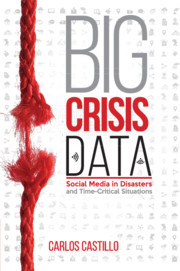Description
Big Crisis Data
Social Media in Disasters and Time-Critical Situations
Author: Castillo Carlos
Social media is invaluable during crises like natural disasters, but difficult to analyze. This book shows how computer science can help.
Language: English
Subject for Big Crisis Data:
Approximative price 39.35 €
In Print (Delivery period: 14 days).
Add to cart
Big Crisis Data
Publication date: 12-2019
Support: Print on demand
Publication date: 12-2019
Support: Print on demand
Approximative price 70.09 €
In Print (Delivery period: 14 days).
Add to cart
Big Crisis Data
Publication date: 07-2016
224 p. · 15.6x23.4 cm · Hardback
Publication date: 07-2016
224 p. · 15.6x23.4 cm · Hardback
Description
/li>Contents
/li>Biography
/li>
Social media is an invaluable source of time-critical information during a crisis. However, emergency response and humanitarian relief organizations that would like to use this information struggle with an avalanche of social media messages that exceeds the human capacity to process. Emergency managers, decision makers, and affected communities can make sense of social media through a combination of machine computation and human compassion - expressed by thousands of digital volunteers who publish, process, and summarize potentially life-saving information. This book brings together computational methods from many disciplines: natural language processing, semantic technologies, data mining, machine learning, network analysis, human-computer interaction, and information visualization, focusing on methods that are commonly used for processing social media messages under time-critical constraints, and offering more than 500 references to in-depth information.
1. Introduction; 2. Volume: data acquisition, storage, and retrieval; 3. Vagueness: natural language and semantics; 4. Variety: classification and clustering; 5. Virality: networks and information propagation; 6. Velocity: online methods and data streams; 7. Volunteers: humanitarian crowdsourcing; 8. Veracity: misinformation and credibility; 9. Validity: biases and pitfalls of social media data; 10. Visualization: crisis maps and beyond; 11. Values: privacy and ethics; 12. Conclusions and outlook.
Carlos Castillo is a researcher in social computing. He is a web miner with a background in information retrieval, and has been influential in the areas of web content quality and credibility. He has co-authored more than seventy publications in top-tier international conferences and journals, a monograph on adversarial web search, and a book on information and influence propagation.
© 2024 LAVOISIER S.A.S.

